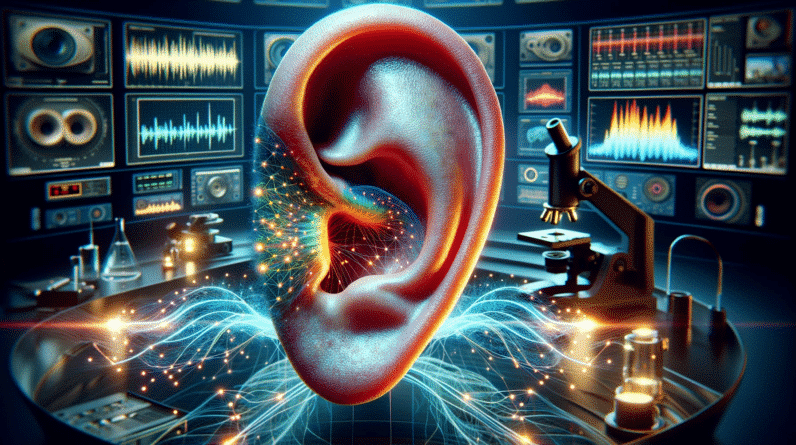
We may earn money or products from the companies mentioned in this post.
As an Amazon Associate I earn from qualifying purchases.
Introduction to Tinnitus
Tinnitus, have you come across this term before? It’s a relatively common health condition experienced by millions worldwide. So, what is tinnitus? Simply put, tinnitus refers to the perception of noise or ringing in the ears. It is not a condition in itself but rather a symptom of an underlying condition such as age-related hearing loss, ear injury, or a circulatory system disorder.
Let’s gain a deeper insight into this health issue by first Understanding Tinnitus. In this post, you’ll discover what tinnitus is, its types, causes, and much more. It’s a comprehensive foundational guide that will help you get a firm understanding of this condition.
Do you feel a ringing sensation in your ears? How can you identify if it’s tinnitus? These aren’t rare questions. Tinnitus can sometimes be tricky to diagnose as its intensity and frequency vary from person to person. However, understanding the Early Symptoms of Tinnitus can make a significant difference. In this post, you can check for the earliest indicators of tinnitus and seek appropriate medical intervention.
Tinnitus: Early and First Signs
Tinnitus is often subtle; it starts slowly and then gradually becomes more noticeable. The first signs may come and go, and you might only notice them during silent moments, such as when you’re trying to sleep. The sound may be mild and somewhat irritating, but for others, it can become significantly disruptive, adversely affecting quality of life.
Let’s take a deeper dive into these early symptoms and their impact on everyday life, and the importance of recognizing them early.
Remember, early detection is the key to managing or treating any health condition effectively, and tinnitus is no exception. Identifying the early signs of this condition can lead to timely interventions and help reduce the severity of symptoms, ensuring you maintain a high quality of life.
For a fact-backed and in-depth exploration of this topic, check out the article on the American Tinnitus Association. You’ll discover the different categories of tinnitus, causes, treatments, and preventive measures, among other invaluable information.
Keep reading to learn more about tinnitus’s early signs and the handy steps to mitigate its progression.
Sounds Associated with Tinnitus
So, what does tinnitus sound like? Well, it’s not like a uniform sound heard by everyone. For some, it’s a high-pitched ringing. For others, it’s a buzzing, hissing, or even a roaring sound. Some even hear music or the sound of chattering voices.
You can find more detailed descriptions of what tinnitus sounds like on the page ear ringing signs. This can be a helpful resource to understand the different sounds one may encounter with tinnitus and how it differs from person to person.
Identifying the First Signs of Tinnitus
Now that you’re familiar with the sounds, how do you identify the first signs? Tinnitus often starts subtly. Initially, you might notice these sounds at quieter moments – perhaps when you’re about to sleep, or when you’re in a relatively silent environment.
With time, these intermittent, almost unnoticeable sounds might become continuous and more persistent. Recognizing these early changes is important and can help prevent a more severe manifestation of this condition. Explore early signs of tinnitus to gain a more comprehensive understanding of what these early signs are.
What Causes Ear Tinnitus?
Knowing the cause of tinnitus can lead to effective treatment approaches. The precise cause can vary, but it is often linked to some form of hearing loss. Other common causes include ear injuries or a disorder in the circulatory system. Are you curious to delve deeper into what causes tinnitus to occur? Visit this page to learn more.
Factors that Might Trigger Early Tinnitus
Quite often, tinnitus doesn’t emerge out of nowhere. There are numerous factors and triggers that might contribute to the early onset of tinnitus. Recognizing and avoiding these triggers can go a long way in managing and mitigating the onset or worsening of this condition.
For an in-depth understanding of tinnitus, consider exploring the World Health Organization’s info on hearing loss , which offers extensive information about tinnitus triggers and prevention. Also, the professional advice given on tinnitus and its triggers by Johns Hopkins Medicine is a worthwhile read.
Effects of Loud Noise and Hearing Loss
One of the most common triggers for tinnitus is exposure to loud noises. This could range from a single loud event like a concert or an explosion to continuous exposure in noisy workplaces. Significant noise exposure can lead to hearing loss, which in turn can result in tinnitus.
To understand better, you might want to visit tinnitus after ear wax removal, which covers the consequences of sudden changes in the ear on tinnitus development. This can underline how sensitive our inner ear structures are and how they can propagate tinnitus when damaged.
The Impact of Ear Infections
Tinnitus isn’t exclusive to noise-related damage. Ear infections, either of the middle or inner ear, can also cause tinnitus. Such infections can result in fluid accumulation, causing pressure changes in the ear or damage to the delicate structures inside, leading to ear ringing symptoms.
You can learn more about how ear infections can spur tinnitus in the article ear infection cause tinnitus found on our website.
Dealing with Early Tinnitus: Preemptive Measures and Remedies
In dealing with any health condition, prevention is always better than cure. And if prevention didn’t work, early detection and management are the next best steps. Just as it’s key to recognize tinnitus’s early signs, it’s as important to find suitable strategies for coping.
When Should You See a Doctor?
Recognizing the early signs is one thing – acting on them is another. If you’re noticing persistent ringing or other sounds in your ears, it’s time to seek professional help. But when should you tune in to these signs and signals and reach out for medical advice?
This best doctor for tinnitus resource offers some clarity on when to seek help, which medical professionals to consult for your tinnitus symptoms and the potential treatment options they might propose.
Common Remedies for Early Tinnitus
While there’s no definitive cure for tinnitus yet, there are several remedies and interventions to manage the symptoms. These range from using sound therapies, certain medications, to cognitive-behavioral therapy.
Does tinnitus go away? covers a wide assortment of remedies available, along with a breadth of cases where symptoms have indeed diminished over time or become more manageable.
How Lifestyle Changes Can Help
You’d be surprised how much small lifestyle changes could help. Be it reducing caffeine intake, practicing mindfulness, or protecting your hearing in noisy environments – there are several tweaks to lifestyle that can significantly reduce the impact of tinnitus on one’s life.
Tinnitus life expectancy provides practical ways in which one can move towards such changes.
Conclusion
Recognizing the early signs and symptoms of tinnitus, understanding potential triggers, and knowing when to seek medical consultation are key steps in effectively managing tinnitus. Equipped with this knowledge, and by incorporating suitable remedial measures and lifestyle changes, it’s possible to minimize its impact and maintain an overall better quality of life.
Early Signs Of Tinnitus - Frequently Asked Questions (FAQ)
Early signs of tinnitus may include ringing, buzzing, humming or clicking sounds in one or both ears. It’s often more noticeable in quieter environments or during the night.
There are several causes of tinnitus including exposure to loud noises, earwax blockage, ear bone changes, age-related hearing loss, Meniere’s disease and other medical conditions like high blood pressure or anemia. Click here to learn more.
Depending on the underlying cause, tinnitus can either be temporary or persistent. For instance, tinnitus caused due to exposure to loud noises or earwax blockage may go away on its own once the underlying cause is addressed. However, tinnitus due to a chronic health condition might require more long term management approaches. Click here for further information.
Professional help should be sought for tinnitus if the condition is affecting your quality of life, resulting in anxiety, sleep disturbances, or concentration problems. Immediate medical attention is required if tinnitus symptoms occur suddenly or are associated with hearing loss or dizziness. Discover more here.
Prevention measures for tinnitus include protecting your hearing in noisy environments, maintaining cardiovascular health, and managing chronic health conditions. Adequate sleep and stress management techniques can also help in minimizing symptoms. Visit our page here for more lifestyle modification recommendations.
Amazon and the Amazon logo are trademarks of Amazon.com, Inc, or its affiliates.
No related posts.






2 Comments